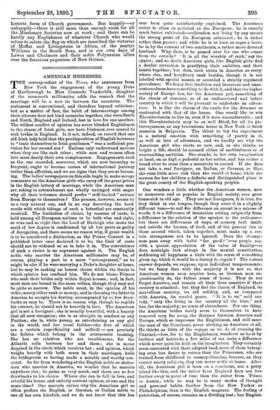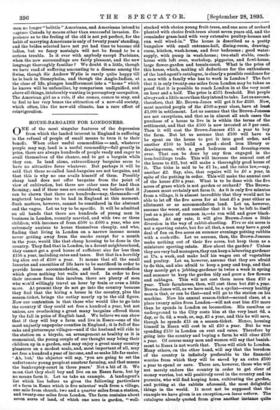AMERICAN HEIRESSES.
THE correspondent of the Times, who announces from New York the engagement of the young Duke of Marlborough to Miss Consuelo Vanderbilt, daughter of the mammoth millionaire, adds the remark that the marriage will be a new tie between the countries. The statement is conventional, and therefore beyond criticism; but as a matter of fact, the habit of intermarriage among their citizens does not bind countries together, else were South and North, England and Ireland, lost in love for one another. The wildest conflict of opinion has never blinded Englishmen to the charm of Irish girls, nor have Irishmen ever ceased to seek brides in England. Is it not, indeed, on record that one old Irish lady held that the predisposition of English heiresses to " trate themselves to Irish gentlemen " was a sufficient pro- vision for her second son ? Nations only understand nations when they are like each other ; while men and women often love most dearly their own complements. Engagements such as the one recorded, moreover, which are now becoming so frequent, ought to become causes of international jealousy rather than affection, and we see signs that they are so becom- ing. The ladies' newspapers on this side begin to make savage comments on the American girls who carry off the great prizes in the English lottery of marriage, while the American men are asking in astonishment not wholly untinged with anger why all their heiresses should prefer " stiff-backed " suitors from Europe to themselves P The process, however, seems to us a very natural one, and in no way deserving the hard words with which tidings of such a betrothal are constantly received. The limitation of choice, by reasons of caste, is held among all European nations to be both wise and right, so wise and so right that the Lord of Barleigh who seeks the maid of low degree is condemned by all but poets as guilty of derogation, and there seems no reason why, if great wealth is to be considered a distinction, as the Prince Consort in a published letter once declared it to be, the limit of caste should not be widened so as to take it in. The convenience of such a choice is no argument against it. The English noble who marries the American millionaire may be, of course, playing a part in a mere "arrangement," as he might be also if he were marrying a Duke's daughter at home, but he may be making an honest choice within the limits to which opinion has confined him. We do not blame Princes who seek their brides only within Royal houses ; and, in fact, most men are bound in the same withes, though they may not be quite so narrow. The noble must, in the opinion of his order, marry either rank or money; and in choosing the latter in America he accepts his destiny, accompanied by as few draw- backs as may be. There is no reason why, though he regilds his coronet, he should not be heartily in love. The American girl is not a foreigner ; she is usually beautiful, with a beauty that all men recognise ; she is as straight in conduct as any Puritan ; she is, while young, as entertaining as any girl in the world, and her usual foibles—the first of which are a certain superficiality and self will — are precisely the foibles which belong to the aristocratic training. She has no relatives who are troublesome, for the Atlantic rolls between her and them ; she is never despised in the circle which receives her ; and opinion, which weighs heavily with both sexes in their marriages, hails the bridegroom as having made a notable and worthy con- quest. So far from wondering at the English noble or states- man who marries in America, we wonder that he marries anywhere else ; he gains so very much, and there are so few drawbacks to his choice. Where else can he fall in love, and rebuild his house, and entirely content opinion, at one and the same time P One marvels rather why the American girl so often prefers the English, or German, or Italian noble to one of her own kinsfolk, and we do not know that this has ever been quite satisfactorily explained. The American suitor is often as polished as the European ; he is usually much better cultivated—cultivation not being by any means the strong point of the European aristocrat ; he is richer rather than poorer; and while he is at least as eager a lover, he is, by the consent of two continents, a rather more devoted husband. Why, then, is he passed over for one who comes from the outside ? ' It is all the worship of rank,' say the cynics ; and no doubt American girls, like English girls, find a double attraction in gratifying their ambition and their hearts together ; but then, rank exists in America as every- where else, and hereditary rank besides, though it is not labelled with special names, or accorded a strictly regulated precedence. We fancy that tradition and literature and unac- customedness have something to do with it, and that the higher society of Europe has, for the American girl, something of the charm of romance, as of an undiscovered and better country in which it will be pleasant to undertake an adven- ture. It is like the charm of the castle for the dreamer as contrasted with that of the house. One would like to win Ehrenbreitstein to live in, even if it were uncomfortable ; and this Ehrenbreitstein may be as well fitted, for all its pic- turesqueness, as any brownstone house in New York or brick mansion in Belgravia. The thirst to try the experiment is a natural emotion with something of poetry in it, as well as love of adventure, and we hardly see why the American girl who elects so new, and, as she thinks, so bright a life, should be accused either of snobbishness or of overvaulting ambition. She stands, in her own imagination at least, on as high a pedestal as her suitor, and has rather a broad river to cross than a mountain to ascend. If she does not take a real foreigner, an Italian, or German, or Slav, she runs little more risk than she would at home, while she secures for her children a definite and distinguished place in the great comity of the English-speaking peoples.
One wonders a little whether the American women, now so numerous and so popular in English society, ever grow home-sick in old age. They are not foreigners, it is true, for they think in our tongue, though they utter it in a slightly different tone—to call the difference an accent is a misuse of words, it is a difference of intonation arising originally from a difference in the relation of the speaker to the audience— but there are differences of ways, of scenery both inside and outside the houses, of food, and of the general ties to those around which, taken together, must make up a cer- tain strangeness not to be ignored. Does the strange- ness pass away with habit " for good ? "—as people say, with a quaint appreciation of the value of finality—or does nostalgia lurk always in the mental constitution, saddening all happiness a little with the sense of something given up, which it would be a luxury to regain ? The correct answer depends, we suppose, upon individual temperaments ; but we fancy that with the majority it is not so, that American women soon acquire here, as German men un- questionably do, the fullest sense of home. They do not forget America, and remain all their lives sensitive if their country is attacked ; but they feel the charm of England, its marvellous security, its old solidity, and, as compared with America, its restful peace. " It is to us," said one lady, " only like living in the country all the time," and has, for the majority, no sense of abroadness. For one thing, the American brides rarely seem to themselves to have removed very far away, the distance between America and Europe, which so impresses the Englishman, and still more the man of the Continent, never striking an American at all. He thinks as little of the voyage as we do of crossing the Channel,—less, for to the Englishman, wanderer as he is by instinct and habitude, a few miles of sea make a difference which never quits its hold on his imagination. They certainly seem contented with their adopted land, most of them betray- ing even less desire to return than the Princesses, who are trained from childhood to cosmopolitanism, because, as they cannot marry subjects, they can never settle at home. After all, the American girl is born on a continent, not a petty island like this, and the suitor from England does not live farther away in point of time than the suitor from 'Frisco or Austin ; while he may be in many modes of thought and personal habits further from the New Yorker or Philadelphian, than is the English magnate. The feeling of patriotism, of course, remains as a dividing test ; but English-
men no longer "belittle " Americans, and Americans intend to capture Canada by means other than successful invasion. Ex- perience as to the feeling of the old is not yet perfect, for the habit of marrying Americans is only of twenty years' standing, and the brides selected have not yet had time to become old ladies, but we fancy nostalgia will not be found to be a serious trouble. Is it ever with anybody except Parisians, when the new surroundings are fairly pleasant, and the new language thoroughly familiar P We doubt it a little, though we have read of suffering amounting to a disease among the Swiss, though Sir Andrew Wylie is rarely quite happy till he is back in Stoneyholm, and though the Anglo-Indian, at the close of life, plunges headforemost into a " home " which he knows will be unfamiliar, by comparison undignified, and above all things, intolerably wanting in peremptory occupation. The American girl as a rule, if she comes, comes to stay, and to feel to her very bones the attraction of a new-old society, which often, like the new-old climate, has a rare effect of reinvigoration.







































 Previous page
Previous page